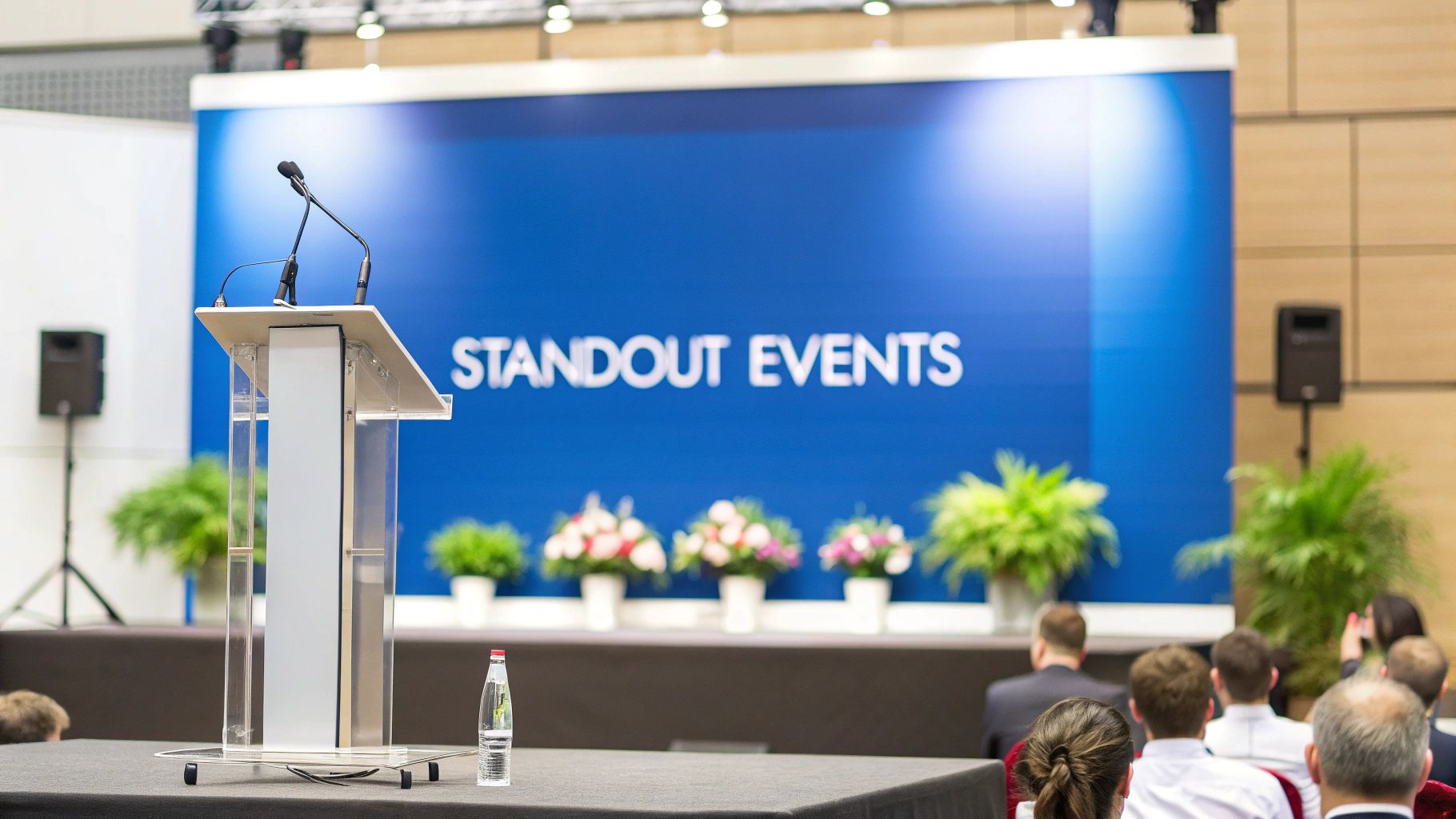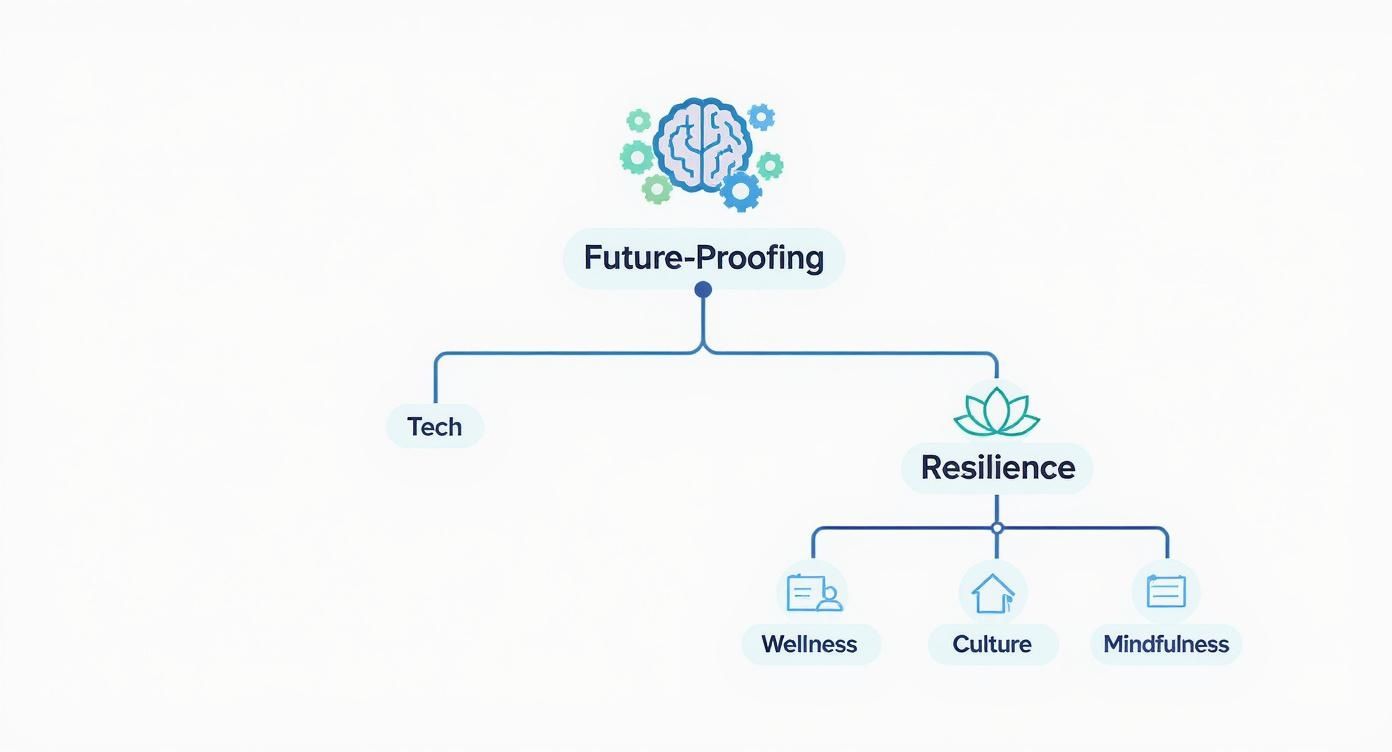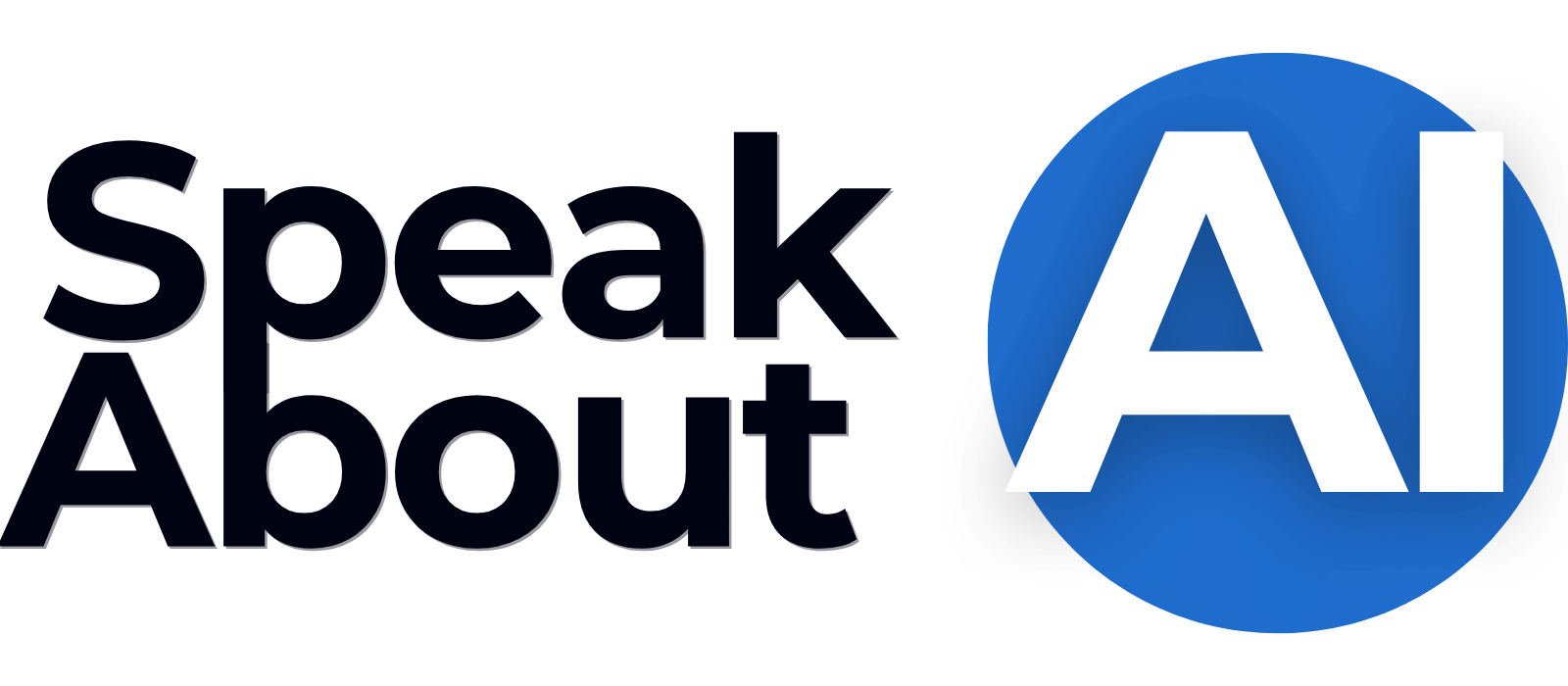Hiring a Keynote Speaker: Your Fast Track to Standout Events

Hiring a keynote speaker is one of those make-or-break decisions that can elevate your entire event. It's about turning a standard gathering into something people talk about for months. The process doesn't start with a list of famous names. It starts with a hard look at your event’s why.
You have to get crystal clear on your core message, what your audience actually needs, and what a successful keynote looks like for *you* before you even think about who to book.
Defining Your Event's Core Message and Goals

Before you can find the right voice, you have to know what you want to say. Getting this part right dictates every other decision and is the single biggest factor in seeing a real return on your investment.
So, what’s the one big idea you want everyone to walk away with? Are you trying to inspire a major shift, get your team up to speed on new tech, or just light a fire under everyone? Your answer immediately narrows the field of potential speakers.
For instance, an annual sales kickoff with a theme like "Innovate and Dominate" needs a high-energy speaker who can deliver actionable sales strategies. A dynamic AI expert from our roster, who can talk about leveraging new tech for sales growth, would be a perfect fit. On the flip side, a healthcare summit on "Patient-Centered Care" calls for a storyteller who can connect with the audience on an emotional level, sharing powerful stories of empathy in medicine.
Aligning Your Message with Audience Needs
Once you've nailed down your message, it's time to think about the people in the room. Who are they? What keeps them up at night? A brilliant message delivered to the wrong audience will fall completely flat.
Think about these key points to match the speaker to your crowd:
- Demographics and Roles: Are they C-suite leaders, mid-level managers, or frontline staff? An executive audience craves high-level strategy, while a technical team needs practical, hands-on takeaways.
- Industry Context: What are the current trends or disruptions in their world? A speaker who gets this context can tailor their talk for maximum impact.
- Desired Emotional Outcome: How do you want people to feel when they leave? Fired up, thoughtful, motivated, or intellectually challenged?
The best keynotes aren’t just about information; they forge an emotional connection. A speaker's ability to tap into the specific pain points and ambitions of your audience is what turns a good speech into a truly great one.
To help you get this right, here’s a simple framework to walk through before you start your search. It forces you to think through the critical components that define the "perfect" speaker for your specific event.
Keynote Speaker Selection Framework
| Selection Criteria | Guiding Questions to Ask | Example Answers for a Tech Conference |
|---|---|---|
| Event Theme & Message | What is the central theme of our event? What is the one key takeaway for the audience? | Theme: "The Future of AI in SaaS." Takeaway: AI is an opportunity, not a threat, for product developers. |
| Audience Profile | Who is in the audience? (Roles, seniority, industry) What are their biggest challenges? | Mid-to-senior product managers and software engineers. Challenge: Integrating AI into existing product roadmaps. |
| Desired Keynote Outcome | What do we want the audience to think, feel, or do after the keynote? | Feel inspired about the potential of AI. Do: Start brainstorming 1-2 AI features for their next sprint. |
| Speaker Style | What delivery style will resonate best? (e.g., inspirational, data-driven, humorous) | Data-driven but engaging and story-oriented. Avoid overly academic or dry presentations. |
| Speaker Expertise | What specific knowledge or background must the speaker have? | Must have hands-on experience building or leading AI product teams. A theorist won't work. |
This simple exercise ensures you’re not just looking for a "good speaker," but the right speaker.
Setting Concrete Goals for the Keynote
Finally, translate your theme and audience needs into specific, measurable goals. This turns the speaker from a performer into a strategic partner. These goals will guide the speaker's content and help you measure the engagement's effectiveness. For help with structuring your event objectives, a detailed corporate event planning checklist can be invaluable.
A vague goal like "motivate the team" is useless. A specific goal like "Equip the sales team with three new AI-powered prospecting techniques they can implement next week" is powerful. That clarity is a game-changer.
A well-defined plan is everything. You can learn more about how to structure your timeline with our comprehensive event planning timeline template. By laying this groundwork, you set yourself up for a strategic, focused, and successful speaker engagement.
Budgeting Realistically for Your Keynote Speaker

Let's talk numbers. Budgeting for a keynote speaker is a crucial step that goes far beyond just the speaker's fee. The best way to approach this is to see it as a strategic investment in your event’s success, not just another line item.
A great speaker does more than just fill a time slot. They are the catalyst for engagement and the voice that reinforces your core message. The financial commitment varies based on their public profile, expertise, and the level of content customization.
Understanding Speaker Fee Structures
Most of the time, speaker fees are quoted as a flat rate. This typically covers the presentation itself and any pre-event calls to align on messaging. But you need to get clear on the specifics. Does that fee cover only the 60-minute keynote, or could it also include a panel discussion or a VIP meet-and-greet?
The price spectrum is wide. Emerging local experts might charge around $2,500, while established specialists—like many on our roster—often command between $10,000 and $40,000. For household names and celebrity figures, you could be looking at over $150,000. If you want to dive deeper into the market rates, you can find more insights on keynote speaker fee benchmarks.
Factoring in Additional Costs
The speaker's fee is just the beginning. To avoid budget surprises, you have to account for all the other expenses. These are often categorized as "all-inclusive" or, more commonly, "plus expenses."
Here are the typical add-ons you need to plan for:
- Travel and Accommodation: This usually includes round-trip airfare (often business or first-class), a professional car service, and a quality hotel room.
- Per Diem: A daily allowance for the speaker's meals and incidental expenses is standard.
- Technical Rider: A speaker may have specific A/V requirements, like a professional-grade microphone, specific lighting, or a hardwired internet connection.
- Materials and Customization: If you need the speaker to create custom workbooks or conduct extensive research beyond their normal prep, expect an additional charge.
A rookie mistake is to fixate on the speaking fee and completely underestimate these other costs. A solid, professional budget anticipates everything, ensuring the entire engagement runs smoothly.
Real-World Budget Scenarios
Let’s say you're planning a national conference on AI in healthcare and want to book a true industry leader from our roster.
A top-tier AI expert, perhaps someone with a background at a major tech company, might have a keynote fee of $35,000. Your total investment needs to account for more than that number.
Here's a realistic breakdown:
| Expense Category | Estimated Cost | Notes |
|---|---|---|
| Speaker's Keynote Fee | $35,000 | For a 60-minute customized presentation. |
| Round-Trip Business Airfare | $2,000 | Cross-country flight. |
| Hotel (2 nights) | $1,000 | At the conference venue or a premium hotel nearby. |
| Ground Transportation | $500 | Airport transfers and local transport. |
| Per Diem (3 days) | $450 | A daily allowance for meals. |
| Total Estimated Investment | $38,950 | A realistic all-in cost for a premier speaker. |
| Speaker's Keynote Fee | $35,000 | For a 60-minute customized presentation. |
|---|---|---|
| Round-Trip Business Airfare | $2,000 | Cross-country flight. |
| Hotel (2 nights) | $1,000 | At the conference venue or a premium hotel nearby. |
| Ground Transportation | $500 | Airport transfers and local transport. |
| Per Diem (3 days) | $450 | A daily allowance for meals. |
This detailed budget gives you a clear picture of the total investment required. This foresight allows you to allocate funds properly and confidently show your stakeholders the full value of hiring a keynote speaker, tying the cost directly to the impact they'll have on your event.
Matching Speaker Expertise with Your Event Theme
The real magic happens when your speaker's message clicks perfectly with your event's theme. Hiring a big-name speaker for the sake of it can fall flat. But when their expertise acts as a powerful amplifier for your core message? That’s when you get the synergy that resonates long after the applause fades.
The trick is to find a speaker who doesn’t just know their topic, but can translate it into actionable insights that speak directly to the challenges and opportunities your audience is facing right now.
Identifying Topics That Actually Resonate Today
The business world moves fast, and the topics that grab an audience's attention are constantly changing. To make a real impact, you need a speaker who is an expert in a field that feels urgent and relevant.
Recent event analyses show a huge focus on cutting-edge tech like artificial intelligence, quantum computing, and automation. But it’s not all about tech. Mental health and digital wellness have moved from the sidelines to center stage. Speakers who can talk about resilience, mindfulness, and well-being are must-haves for organizations that want sustainable productivity. You can see more on these trends in this breakdown of the top keynote speaker trends.
The bottom line? Themes around innovation, adaptation, and human well-being are dominating the conversation.
Connecting Expertise to Your Event Goals
Once you have a relevant topic, connect it directly to your event goals. This moves your message from broad to sharp and focused. You need to think about the direct application of the speaker's knowledge to your industry.
Let’s walk through a couple of real-world scenarios:
- Event Theme: "Future-Proofing Your Workforce"
* Ideal Speaker Profile: An expert on AI's role in human collaboration.
* Why it works: Instead of a generic talk on AI, this speaker can zero in on how technology can augment human skills, not replace them. Our roster features specialists who have led these kinds of AI integration projects and know exactly what works.
- Event Theme: "Building a Resilient Company Culture"
* Ideal Speaker Profile: A specialist in corporate mindfulness and mental wellness.
* Why it works: This speaker gives your team practical tools for managing stress and preventing burnout. Their insights directly support the goal of creating a healthier, more engaged workforce.
The goal is to create a seamless link between the speaker's expertise and your desired outcome. When an attendee thinks, "This person is speaking directly to me and my problems," you've won.
Go for Specialists, Not Generalists
When you’re hiring a keynote speaker, it’s easy to get drawn to a well-known motivational figure. But for most corporate events, a specialist delivers far more value. A true subject matter expert brings a depth of knowledge and credibility that a generalist simply can't touch. You can explore more about the impact of specialized motivational speakers for businesses in our detailed guide.
A specialist can:
- Use industry-specific language that builds instant rapport.
- Share relevant case studies and examples from your audience’s world.
- Answer complex questions with authority during the Q&A.
- Provide specific, actionable takeaways attendees can use immediately.
Imagine you're hosting an event for financial planners. A general motivational speaker might fire them up for a week. But a fintech expert from our roster who speaks on how AI is changing wealth management will equip them with the knowledge they need to stay competitive, providing a tangible return on investment.
How to Properly Vet Potential Keynote Speakers
You’ve got your shortlist. Now the real work begins. This is where you look past the slick promo video to confirm you’ve found someone who is not just an expert, but also a dynamic professional who can connect with your audience.
Your goal is to verify their ability to command a room and their process for tailoring the message. One of the biggest mistakes planners make is relying solely on a speaker's sizzle reel. Remember, those are highlight clips by design—they don't show how a speaker handles a full 60-minute presentation.
Look Beyond the Promo Video
To get an authentic feel for a speaker's stage presence, ask for full-length, unedited recordings of previous gigs. Watching a complete talk gives you a much clearer picture.
As you're watching, keep an eye out for these key elements:
- Pacing and Energy: Does their energy stay consistent throughout the talk?
- Audience Connection: Are they speaking at the audience or with them? Look for signs of genuine interaction.
- Handling the Q&A: How do they handle tough questions? This tests their ability to think on their feet and showcases their true expertise.
A speaker's real value is revealed in the unedited moments. How they recover from a minor technical glitch tells you more about their professionalism than any polished highlight reel ever will.
This infographic offers a simple decision tree to help you align your event's core themes—like future-proofing or resilience—with the right type of speaker expertise.

As you can see, a primary goal like "future-proofing your business" naturally points you toward specialists in AI and technology. On the other hand, a focus on "resilience" leads to experts in wellness and company culture.
Essential Questions for Your Initial Call
That first call is your chance to vet their professionalism and process. This conversation isn't just about their topic; it's about how they operate as a partner.
Here are a few crucial questions to have ready:
- "Can you walk me through your process for customizing a presentation for a new client?"
A great speaker should have a clear, structured system. Listen for them to mention things like pre-event briefing calls and detailed questionnaires. A vague "I'll make it relevant" is a major red flag. All speakers on our roster follow a detailed preparation process.
- "Tell me about a time you spoke to an audience like ours."
You need someone who gets your industry's language. An expert who has already spoken at other tech conferences will know the acronyms and trends relevant to your team, which makes their message instantly more credible.
- "How do you typically handle the technical and logistical side of things?"
This question helps set clear expectations around A/V needs and travel. A seasoned pro will have a straightforward tech rider and a clear process, which makes life easier for your event team.
Choosing the right partner is a detailed process. For a deeper look at how an agency can streamline this entire vetting process, you can find some great information on [why to use a speakers bureau](https://speakabout.ai/blog/why-use-a-speakers-bureau). Their experience is a huge asset in finding and confirming the perfect candidate for your stage.
Meeting Modern Audience Expectations and Formats
Let's be honest: the days of a speaker standing stiffly behind a lectern are long gone. Audiences today have been shaped by the punchy style of TED Talks and dynamic online content. They want an experience.
When you hire a keynote speaker now, you're looking for someone who can deliver "edutainment"—a seamless blend of education and entertainment.
Modern crowds expect shorter, high-impact presentations, usually in the 30 to 45-minute range, that prioritize powerful storytelling. This approach is deeply connected to the principles of modern influencer marketing, where genuine connection and engagement are paramount. Speakers who thrive in this environment use striking visuals and maintain a conversational tone.
Adapting to Live, Virtual, and Hybrid Formats
The explosion of virtual and hybrid events has been a game-changer. This isn't just a different stage; it requires a completely different skill set. A speaker who can command a packed auditorium might fall flat when trying to connect with a remote audience through a camera.
When you're vetting a speaker for a virtual or hybrid event, you need to look for specific abilities. Can they keep their energy high without live feedback? Are they comfortable using virtual tools to create real interaction?
For example, one of our AI speakers recently delivered a keynote to a hybrid audience of over 1,000 people. They seamlessly integrated live polls that both in-person and virtual attendees could participate in from their phones. That one simple act created a unified experience, bridging the physical and digital divide.
The Power of Interactive Engagement
Passive listening is out. Active participation is in. The best keynote speakers today are masters of engagement, using a toolbox of techniques to pull the audience into the presentation.
Some of the most effective interactive elements include:
- Live Polling and Word Clouds: These are fantastic for getting instant feedback and making the audience feel like they are co-creating the presentation.
- Structured Q&A Sessions: A great speaker weaves Q&A opportunities throughout the talk or works with a moderator to field questions from a virtual chat.
- Breakout Prompts: For longer sessions, a speaker might pose a challenge and have attendees discuss it in small groups—either at their tables or in virtual breakout rooms.
Today's audience doesn't want to be spoken at. They want to be part of the story. A speaker's ability to create an interactive environment is a direct measure of their effectiveness.
Prioritizing Storytelling Over Slides
Facts and data are important, but stories move people to action. The most sought-after keynote speakers are expert storytellers who wrap complex ideas in compelling and memorable narratives.
This means getting away from text-heavy slides. Instead, look for speakers who use visuals—high-impact images, short video clips, or simple infographics—to support their stories, not replace them. The slide deck should be a visual backdrop, not a teleprompter.
When you're vetting a potential speaker, ask to see examples of their slide decks. If you see more than a handful of words per slide, that's a red flag. All of our speakers are experts at crafting visually engaging presentations that make their message stick long after the event is over.
Common Questions About Hiring a Keynote Speaker
As you get closer to locking in your speaker, a few practical questions always pop up. Getting these details right is what separates a smooth engagement from a last-minute scramble. This is where having an experienced bureau in your corner really pays off.
One of the most common mistakes we see is underestimating how quickly a top speaker’s calendar fills up.
How Far in Advance Should I Book a Keynote Speaker?
For the most in-demand speakers—especially the AI leaders on our roster—you need to start the process 6 to 12 months before your event.
That lead time gives you the best shot at securing your first choice. More importantly, it gives them the runway to craft a presentation that’s truly customized for your audience, not just a canned speech.
If you're on a tighter schedule, a 3 to 6-month window can sometimes work. But if you have your heart set on a specific person, booking early is always the smart move.
What Should a Keynote Speaker Contract Include?
A solid contract is your best friend. It’s a tool that protects both you and the speaker by making sure everyone is on the same page. A comprehensive agreement is a non-negotiable part of our booking process.
At a minimum, your contract should clearly spell out:
- The Financials: The speaker's total fee and a clear payment schedule.
- Logistics: Who is responsible for booking and paying for travel, hotel, and ground transportation.
- Event Details: The date, time, location, and the exact length of the presentation.
- Tech Rider: All A/V needs, like specific microphones or projectors.
- The "What Ifs": Clauses covering cancellation and permissions for recording the session.
How Do I Best Prepare My Speaker for Our Event?
This is the secret sauce. Great preparation is what turns a good keynote into an unforgettable one. Your goal is to give the speaker enough context that they feel less like a guest and more like an insider speaking to their own team.
The more you share about your audience’s pain points, your company’s inside jokes, and your event's specific goals, the more the speaker’s message will resonate. They shift from being a hired speaker to a strategic partner for the day.
We always set up a detailed pre-event briefing call for this very reason. Use that time to walk them through your audience demographics, key event themes, and what you want people to do after the speech. Share company background, recent wins or challenges, and the overall vibe of the event. This collaborative prep work ensures the keynote lands with maximum impact.
At Speak About AI, our roster features the world's leading experts on artificial intelligence, ready to deliver the insights your event needs. We handle the contracts, logistics, and preparation, making the process of hiring a keynote speaker seamless. Find your perfect AI speaker today at https://speakabout.ai.
